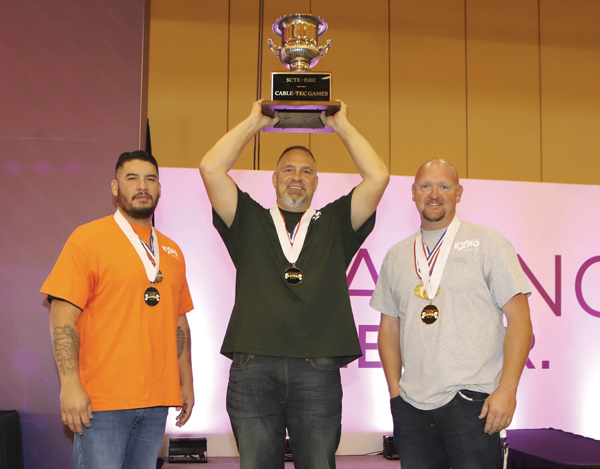Experience L&D and Let the Games Begin!
By Jill Banks
Backed by unprecedent governmental investment in infrastructure, the joint efforts of the public and private sectors to expand connectivity and provide universal access to high speed, reliable Internet are sadly hampered by a looming labor shortage and war on talent. You’ve heard it before but attracting new employees to the industry is no longer enough. It is imperative to upskill the existing workforce to support the global expansion of connectivity and technological innovation. Thankfully, SCTE® Cable-Tec Expo® is right around the corner, and I say, “Let the L&D Games begin!”
Now in its sixth year at Expo, the L&D Experience was created to help grow the knowledge and skills of the learning and development community within the telecommunications industry. The L&D Experience for this year’s Expo was curated to go to infinity and beyond, to inspire training programs for the workforce of tomorrow.
Co-chaired by Agnes Francis-Adolphine, director of learning & implementation at Cox Communications, and Rich LaPat, formerly of Comcast, “Infinite Learning – Inspire, Motivate, & Cultivate” aims to do exactly that. The live interactive session is focused on how to motivate and inspire learning during times of evolution while keeping learners engaged. Participants will learn to navigate the changing demands and stay connected with business and learner needs, and take away some tools of the trade that will help move their organizations forward.
The L&D Experience takes place on Tuesday, September 20, starting at 1 p.m.
On Wednesday morning, I will moderate a workshop focused on “Agile Learning Through Virtual Training and Machine Learning.” Abbie O’Dell, of Charter Communications and president of SCTE’s Rocky Mountain Chapter, will join me to reveal findings from her study into how trainers perceive the relationship between an immersive virtual training environment (VTE) and the post-training confidence of learners. Comcast’s Mike Baker will share learnings from cohort-based programs looking at how machine learning (ML) leverages internal subject matter experts (SMEs) as adjunct faculty and mentors.
Then I encourage you to join Comcast’s Bradford Beschler as he moderates a lively discussion on “The Science of Learning: Analytics, Machine Learning and Inclusivity.” Attracting and retaining employees requires delivering learning that is engaging, actionable, and accessible. This session is brimming with the brain power of SCTE’s Bob Wald, Charter’s Matthew Gress, and Comcast’s Erika Schoch.
Panels, sessions and workshops are great for L&D leaders looking to advance their training programs, but what about the workers? One way to inspire, motivate, and cultivate learning is by providing opportunities to showcase skills through activities like some friendly competition.
The culmination of the International Cable-Tec Games will once again be in person, live in Philly at Expo 22 on Wednesday, Sept. 21! The Games have been an annual Expo tradition since 1991. More than two dozen competitors face off in events, hosted by industry vendors, including meter reading, OTDR, MTDR, fiber splicing, cable splicing, drop connection and cable jeopardy. The medallions awarded in the Games are symbolic of the training that creates winners in the workplace.
For those who might be unfamiliar, competition among cable system personnel centers around technical tasks. Support for the first games came from Paul Levine of CT Publications (Phillips Business Information, Inc.) and he also developed the initial design of the award medallions. Contributions were made by industry sponsors.
The Cable-Tec Games, originally called Cable Games, were first held in 1989 by the SCTE Rocky Mountain Chapter and have been held annually by that Chapter ever since.
As is tradition, SCTE Chapters and Meeting Groups host Cable-Tec Games at all levels of the organization. Local, state and regional competitors participate to determine who will represent the chapter or region at the International Cable-Tec Games at Expo.
Single events in the games have evolved as defined by participation, practice and interest in the skill they measure. Event hosts and sponsors have played a tremendous part in this evolution and are most generous in their support of events during the competitions. The Cable-Tec Games Subcommittee oversees all aspects of the program and is chaired by Comcast’s Mike O’Dell, a past International Cable-Tec Games competitor and local winner from the Penn-Ohio Chapter. Without this dedication, the games “do not go on.”
Competing in an event that is also your job shines a spotlight on your skill level and gives an additional measure of importance to participating. SCTE hopes all members are provided the opportunity to be a part of this treasured tradition and benefit from taking part.
Whether competing in the Games, cheering on the competitors from across the globe or learning new training tactics and technologies at the L&D Experience, I encourage you to prioritize the continuing education of your workforce and get ready to learn. I look forward to seeing you in Philadelphia at Expo. Let the Games begin
Now in its sixth year at Expo, the L&D Experience was created to help grow the knowledge and skills of the learning and development community within the telecommunications industry.
2019 International Cable-Tec Games winners.


Jill K. Banks,
Director, Learning Operations for the Society of Cable Telecommunications Engineers (SCTE®), a subsidiary of CableLabs®
Images: SCTE




